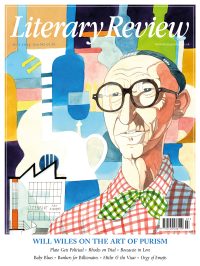Rowan Williams
Scattered Stories
Sanctuary: Ways of Telling, Ways of Dwelling
By Marina Warner
William Collins 416pp £22
Reading this book against the backdrop of a full-blooded attack in the United States on the idea of ‘sanctuary’ is a painful exercise. Both the history and the culture that Marina Warner discusses here feel, from one point of view, like survivals from a different era. From another, they feel like an urgent call to action. The book is diffuse, sometimes rather overloaded with references and digressions, but never dull. It documents a tight web of practices and ideals without which any culture is not only impoverished but also seriously damaged. Warner’s complex, cumulative engagement with the topic becomes itself a kind of migrant journey to whose rhythms the reader has to surrender.
The notion of sanctuary is pervasive in human cultures, visible in children’s games and ritual practices. Sanctuary is a space that is both strange and safe, an extra-territorial territory, removed from the hierarchies and systems that surround it. Anyone who is or has been made a stranger by violence, exclusion or dispossession can be secure there, at least while negotiating their long-term safety.
Warner begins with an outline of the history of this convention before moving on to a series of fascinating, erudite chapters on how various narrative and ritual traditions deal with displacement, transplantation, exile and memory. In the final section, she portrays language and storytelling as world-creating phenomena that always involve

Sign Up to our newsletter
Receive free articles, highlights from the archive, news, details of prizes, and much more.@Lit_Review
Follow Literary Review on Twitter
Twitter Feed
Alfred, Lord Tennyson is practically a byword for old-fashioned Victorian grandeur, rarely pictured without a cravat and a serious beard.
Seamus Perry tries to picture him as a younger man.
Seamus Perry - Before the Beard
Seamus Perry: Before the Beard - The Boundless Deep: Young Tennyson, Science, and the Crisis of Belief by Richard Holmes
literaryreview.co.uk
Novelist Muriel Spark had a tongue that could produce both sugar and poison. It’s no surprise, then, that her letters make for a brilliant read.
@claire_harman considers some of the most entertaining.
Claire Harman - Fighting Words
Claire Harman: Fighting Words - The Letters of Muriel Spark, Volume 1: 1944-1963 by Dan Gunn
literaryreview.co.uk
Of all the articles I’ve published in recent years, this is *by far* my favourite.
✍️ On childhood, memory, and the sea - for @Lit_Review :
https://literaryreview.co.uk/flotsam-and-jetsam